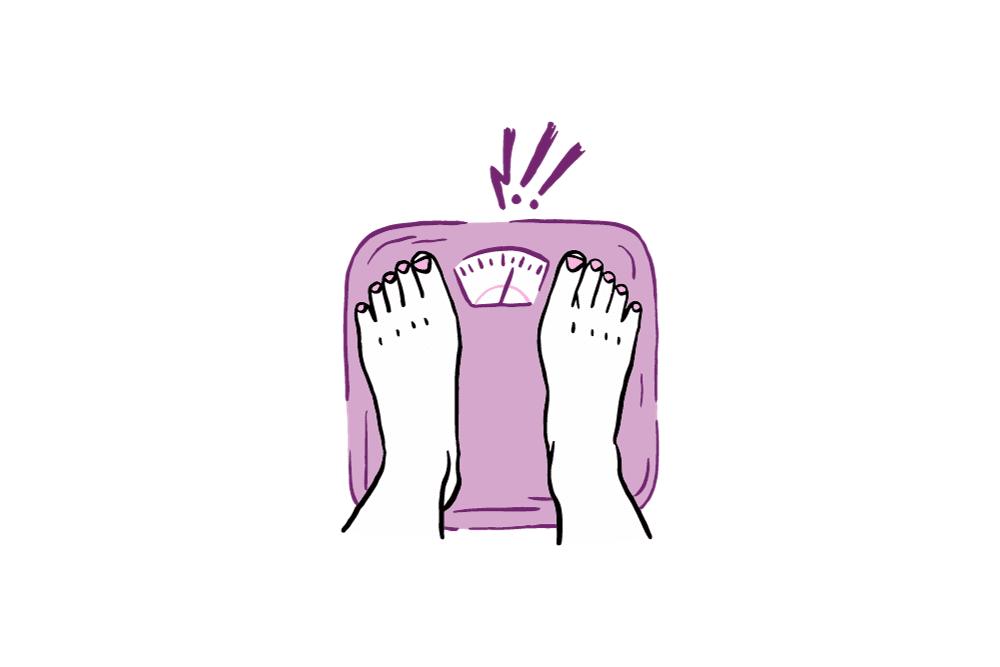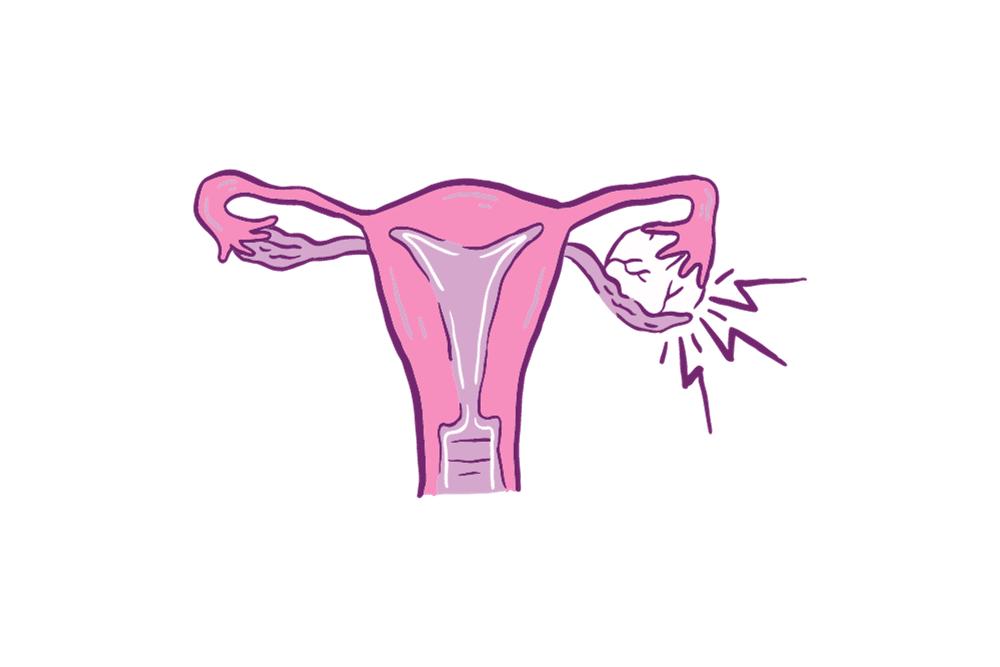Learning how to better understand your body can be empowering yet challenging. For many individuals with ovaries, the enigma of polycystic ovary syndrome (PCOS) often begins with subtle signs that might go unnoticed. From irregular periods to unexpected changes in weight and PCOS belly, these early symptoms might seem like mere quirks. Still, they could be your body’s way of communicating something more significant.
Discovering the first signs of PCOS is not just about decoding your body’s language; it’s about taking control of your reproductive health. In this article, we dive into the world of PCOS, exploring how recognising these initial cues can empower you to make informed decisions, seek timely medical advice, and ultimately, live a healthier, more balanced life.
First Signs of PCOS
Detecting the onset of polycystic ovary syndrome (PCOS) involves recognising subtle indicators that may manifest in various aspects of your health.
Irregular Menstrual Periods
One of the initial indicators of PCOS is irregular periods. If your menstrual cycle resembles a rollercoaster ride—sometimes arriving sooner than expected or making you wait longer than usual—it could be your body’s way of signalling hormonal imbalances associated with PCOS.
Unexplained Weight Fluctuations
Have you noticed unexplained changes in your weight, especially around the midsection? PCOS is often linked to insulin resistance, which can lead to weight gain, particularly in the abdominal area. Understanding these subtle shifts can be pivotal in early detection and safely losing weight with PCOS .
Persistent Acne and Skin Issues
PCOS has a knack for manifesting itself on the skin. If you find yourself battling persistent or severe acne, oily skin, or even dark patches, consider whether these skin changes are early signs of PCOS. The sooner you know the signs, the sooner you can look at how to get rid of acne scars .
Abnormal Hair Growth
Experiencing excess hair growth in unexpected places or, conversely, scalp hair loss? PCOS can influence your body’s level of androgens (male sex hormones), leading to changes in hair growth patterns that may serve as early red flags.
Fatigue and Mood Swings
Feeling unusually tired and noticing mood swings that seem out of the ordinary? Hormonal imbalances associated with PCOS can impact energy levels and emotional well-being, offering additional clues to its presence.
Understanding these first signs of PCOS is a key step in the proactive management of this condition. By recognising these signals early on, you empower yourself to take charge of your health and seek the guidance necessary for a well-informed, tailored approach to living with PCOS .

Causes of PCOS
Understanding why polycystic ovary syndrome (PCOS) occurs involves looking into the complex mix of hormonal, environmental, and genetic factors that contribute to this common disorder in young women.
Hormonal Imbalance
PCOS is intricately tied to hormonal irregularities, particularly in the levels of androgens (male sex hormones) and insulin. Elevated androgen levels can disrupt the regular functioning of the ovaries, leading to the characteristic symptoms of PCOS.
Insulin Resistance
Insulin, a hormone responsible for regulating blood sugar levels, plays a pivotal role in PCOS. Individuals with PCOS often experience insulin resistance – where the body’s cells don’t respond effectively to insulin. This can result in higher insulin levels, contributing to the hormonal imbalances associated with PCOS.
Genetics and Family History
While the exact genetic factors contributing to PCOS are still being unravelled, there is evidence to suggest a hereditary component. If close family members, such as a mother or sister, have been diagnosed with PCOS, it may increase your susceptibility to developing polycystic ovarian syndrome.
Inflammation
Chronic inflammation is emerging as a potential contributor to PCOS. Inflammation can adversely affect the ovaries and disrupt their normal function. Lifestyle factors such as poor eating and sedentary habits can exacerbate inflammation, influencing the development of PCOS.
Environmental Factors
Exposure to certain environmental factors, such as endocrine-disrupting chemicals, may contribute to the development of PCOS. These chemicals, found in some plastics and pesticides, can interfere with hormonal balance and potentially increase the risk of developing PCOS.
Understanding the multifaceted causes of PCOS is vital in demystifying this condition. By delving into the intricate interplay of hormones, genetics, and environmental factors, you can gain insights that can inform proactive strategies for managing the impact of PCOS on your overall well-being.

Identifying PCOS Symptoms
Recognising the signs of polycystic ovary syndrome (PCOS) is pivotal for early intervention and effective management.
Menstrual Irregularities
The most obvious sign of PCOS is often irregular menstrual cycles. Pay attention to variations in the length and regularity of your periods and the presence of unusually heavy or light flows.
Ovulatory Dysfunction
PCOS can disrupt the ovulation process, leading to fertility challenges. If you are trying to conceive and experiencing difficulties, it’s important to consider ovulatory dysfunction as a potential symptom of PCOS.
Elevated Androgen Levels
Increased levels of androgens, often referred to as male sex hormones, can trigger visible symptoms such as acne , excessive hair growth (hirsutism), or male-pattern baldness. Monitoring these external signs can offer valuable insights into hormonal imbalances.
Polycystic Ovaries on Ultrasound
While not everyone with PCOS will have cysts on their ovaries, the condition is named after the small, fluid-filled sacs that can form. An ultrasound may reveal these cysts, contributing to the diagnostic criteria for PCOS.
Insulin Resistance and Weight Fluctuations
Persistent weight gain, especially around the abdomen, coupled with insulin resistance, is common in individuals with PCOS. Monitoring changes in weight and addressing insulin resistance can be integral to managing PCOS symptoms.
Skin and Hair Changes
Unexplained acne, oily skin, or changes in hair growth patterns can indicate PCOS. Keeping an eye on these external manifestations provides additional clues for early detection.
Mood Swings and Fatigue
PCOS can impact mental well-being, leading to mood swings and increased fatigue. If you find yourself grappling with unexplained changes in mood or energy levels, it’s essential to consider these as potential symptoms.
Find out – does the pill affect your mood?
Identifying PCOS symptoms requires a holistic approach that considers both physical and emotional aspects. By recognising these key indicators, you can take proactive steps to engage with healthcare professionals, facilitating early diagnosis and personalised management strategies for a more balanced and fulfilling life with PCOS.

How to Know if You Have PCOS
If you’re wondering whether you have polycystic ovary syndrome (PCOS), certain indicators and diagnostic steps can help shed light on this common hormonal condition.
Track Your Menstrual Cycle
Find the best period-tracking apps and start keeping a menstrual diary to monitor the regularity of your periods. Note any significant variations in cycle length, the presence of heavy or light flows, or skipped periods. Irregular menstruation is often a prominent sign of PCOS.
Be Mindful of Hormonal Changes
Pay attention to changes in your skin and hair. Persistent acne, excessive facial or body hair growth, or thinning hair on the scalp could indicate elevated androgen levels associated with PCOS.
Assess Your Weight and Insulin Sensitivity
Monitor your weight, especially around the abdominal area. PCOS is linked to insulin resistance, which can contribute to unexplained weight gain. If you notice difficulty maintaining or losing weight and have concerns about insulin sensitivity, it’s worth discussing with a healthcare professional.
Fertility Awareness
If you are trying to conceive without success, consider the possibility of ovulatory dysfunction related to PCOS. Keep track of your menstrual cycles and discuss any challenges with your healthcare provider to explore potential underlying causes.
Listen to Your Body
Be attuned to signals of fatigue, mood swings, and changes in energy levels. PCOS can impact mental well-being, and recognising shifts in mood and energy can be crucial in identifying potential symptoms.
Consult with Healthcare Professionals
If you suspect you may have PCOS based on observed symptoms or concerns, seek guidance from healthcare professionals. A thorough examination, including blood tests and imaging, may be recommended to confirm the diagnosis.
Holistic Health Approach
Consider adopting a holistic approach to your health, including a balanced diet, regular exercise, and stress management . Lifestyle modifications can play a significant role in managing PCOS symptoms and improving overall well-being.
Empowering yourself with knowledge and actively participating in your health journey is key to identifying PCOS. By combining self-awareness with professional guidance, you can take proactive steps towards diagnosis, paving the way for personalised strategies to manage and thrive with PCOS.
Get birth control pills online with Youly! »PCOS and Birth
Navigating the intersection of polycystic ovary syndrome (PCOS), fertility and childbirth requires a nuanced understanding of how this hormonal disorder can impact reproductive health and pregnancy.
Fertility Challenges
PCOS can present hurdles on the path to conception. Ovulatory dysfunction, a common feature of PCOS, may lead to irregular or absent menstrual cycles, impacting fertility. Individuals with PCOS may face challenges in getting pregnant and may require assistance such as fertility treatments.
Increased Risk of Pregnancy Complications
For those with PCOS who successfully conceive, it’s important to be aware of potential complications during pregnancy. PCOS is associated with a higher risk of gestational diabetes, high blood pressure, and preterm birth. Regular prenatal care is crucial to monitor and manage these risks effectively.
Importance of Preconception Planning
Individuals with PCOS planning to start a family should consider preconception planning. This involves optimising health, addressing underlying conditions, and consulting healthcare professionals to ensure the best conditions for a healthy pregnancy.
Monitoring Gestational Diabetes
Pregnant individuals with PCOS may undergo screening for gestational diabetes, a condition more prevalent in those with insulin resistance. Early detection and management of gestational diabetes are essential for the well-being of both the parent and the baby.
Lifestyle Modifications for a Healthy Pregnancy
Adopting a healthy lifestyle is crucial for managing PCOS during pregnancy. This includes maintaining a balanced diet, engaging in regular, moderate exercise, and managing stress. These lifestyle modifications can contribute to better pregnancy outcomes.
Postpartum Considerations
After childbirth, individuals with PCOS should continue to prioritise their health. Hormonal fluctuations during the postpartum period can influence PCOS symptoms. Consulting with healthcare providers and maintaining a healthy lifestyle can aid in managing these changes.
By understanding the potential challenges and taking steps for preconception planning and ongoing care, individuals with PCOS can enhance their chances of a healthy pregnancy and successful childbirth. Working collaboratively with healthcare professionals is crucial to tailor a plan that addresses individual needs and optimises the journey to parenthood.

PCOS Symptoms Despite Regular Periods
Experiencing PCOS symptoms while having regular periods can be confusing, emphasising the importance of understanding the varied aspects of this hormonal condition beyond just menstrual patterns.
Hidden Hormonal Imbalances
While regular periods might suggest a seemingly normal menstrual cycle, individuals with PCOS can still experience hormonal imbalances. Elevated androgen levels, insulin resistance, and other underlying hormonal irregularities may persist, contributing to PCOS symptoms despite apparent menstrual regularity.
Ovulatory Dysfunction
PCOS is not solely defined by irregular periods; ovulatory dysfunction is a key characteristic. Even with consistent menstruation, individuals with PCOS may still face challenges related to irregular ovulation, impacting fertility and contributing to other symptoms such as acne and hirsutism.
Silent Polycystic Ovaries
Not everyone with PCOS exhibits the classic ovarian cysts often associated with the condition. Some individuals may have “silent” polycystic ovaries, meaning the cysts are not readily apparent on ultrasound. This hidden aspect can make diagnosis challenging, especially when relying solely on the presence of cysts.
Insulin Resistance Beyond Menstrual Regularity
Insulin resistance, a common feature of PCOS, may persist even in the absence of noticeable menstrual irregularities. This can contribute to symptoms such as weight gain, skin issues, and fatigue, emphasising the need to consider a broader range of indicators beyond the menstrual cycle.
Individual Variability in Symptom Presentation
PCOS is a highly variable condition, and symptoms can manifest differently from person to person. Some individuals may experience classic signs like irregular periods, while others may present with symptoms such as acne, hirsutism, or mood swings, even if their menstrual cycles appear regular.
Holistic Assessment and Personalised Care
When symptoms persist despite regular periods, a comprehensive evaluation is crucial. Healthcare professionals may consider a combination of clinical assessment, hormonal profiling, and imaging studies to uncover hidden aspects of PCOS. This individualised approach ensures a more accurate diagnosis and tailored management plan.
Understanding that PCOS is not solely defined by irregular menstrual cycles opens the door to recognising its diverse manifestations. For those experiencing symptoms despite seemingly regular periods, a holistic assessment that goes beyond menstrual regularity is key.

What PCOS Looks Like
Polycystic ovary syndrome (PCOS) is a complex hormonal disorder that manifests in a spectrum of symptoms, making its appearance unique for each individual. Common signs include irregular menstrual cycles, marked by unpredictable periods that may be infrequent or absent. These irregularities often stem from disruptions in the ovulation process, a hallmark of PCOS. Beyond the menstrual realm, elevated levels of androgens, often termed male hormones, can lead to visible manifestations such as acne , excessive facial or body hair growth, and in some cases, male-pattern baldness. Weight management can become challenging due to insulin resistance, contributing to unexplained weight gain, particularly around the abdominal area.
Underlying these external symptoms, PCOS may silently affect the ovaries, forming small cysts that may or may not be apparent on ultrasound. However, it’s important to recognise that PCOS is not a one-size-fits-all condition; its presentation varies widely. Some individuals may experience fertility challenges, while others may have regular periods but contend with other symptoms like fatigue, mood swings, or skin issues.
Understanding the Causes of PCOS
Polycystic ovary syndrome (PCOS) is rooted in a complex interplay of genetic, hormonal, and environmental factors. While the precise causes remain elusive, a strong genetic predisposition is evident, with a higher likelihood of PCOS in individuals with affected family members.
Hormonally, PCOS is characterised by elevated levels of androgens, often leading to disruptions in ovarian function. Insulin resistance, a condition where the body’s cells become less responsive to insulin, is another key contributor. This resistance triggers an increase in insulin levels, further aggravating hormonal imbalances and creating a conducive environment for the development of PCOS.
Environmental factors, such as exposure to endocrine-disrupting chemicals, may also play a role, adding complexity to the intricate web of influences contributing to the onset of PCOS.
A comprehensive understanding of these multifaceted causes is essential for effective diagnosis, management, and the development of targeted interventions for individuals navigating the challenges of PCOS.
Ready to take charge of your reproductive health? Our informative guide on the first signs of PCOS is just the beginning. Dive deeper into proactive health management and discover how Youly can support you every step of the way.
Start your online consult now! »Disclaimer: The information provided in this blog is for general informational purposes only and is not intended to be a substitute for professional medical advice, diagnosis, or treatment. Always seek the advice of your physician or other qualified health provider with any questions you may have regarding a medical condition. Never disregard professional medical advice or delay in seeking it because of something you have read on this blog. Reliance on any information provided in this blog is solely at your own risk. The health and medical information on this site is provided “as is” without any representations or warranties, express or implied.

